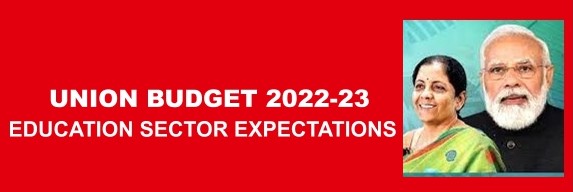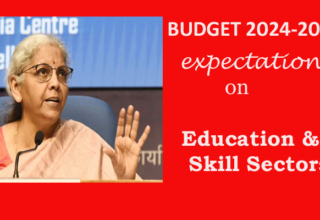
Edtechs join chorus demanding reduction in online education services GST rate from 18% to 5%
“We will have to cut down other expenses but provide enough money for the education budget because that is where the future lies in India,” argues Nitin Potdar, Partner, J Sagar Associates. All those connected with education are just hoping for that sentiment to prevail in Union Budget due on February 1, 2022.
“Reduce GST substantially if not completely waived off on educational services including technology solutions which became the backbone of our institutions during the pandemic. This has been an ask for a long time and I feel the time has come for the Government to make it happen. Another key change I am looking forward to in the budget 2022 is a clear plan to bridge the digital divide in public schools and higher educational institutions, “adds Hemant Sahal, Founder and CEO, CollPoll.
The non-digital education services providers have own expectations and demands. According to business chamber PHDCC, the commencement of the academic session between January to July across various regions. 55%-60% of sales to wholesale dealers are recorded in the Jan-March quarter of the financial year. Sales to end consumers are made subsequently between Mar-August. Sale returns of unsold inventory, if any are identified and initiated thereafter. Considering the geographically dispersed distribution network and season extending upto August of the subsequent financial year, it is difficult to complete the entire exercise of taking returns w.r.t sales made in the preceding financial year within September of the subsequent financial year. It has therefore suggested that budget show announce revision of the timeline for issuance of Credit Notes towards receipt of sales returns to 12 months from the end of the financial year or at least till the time filing of Annual Returns for the said Financial Year. It has also it is suggested to make necessary system amendments in the GSTIN Network to enable seamless availment of credit in view of current GSTIN system does not allow upload of credit notes containing reference of original invoice issued from a State different from the State in which the return of goods was taken. This results in loss to the supplier of goods as output tax liability cannot be reversed.
“As publishers, we would urge the Govt. to reduce GST on the printing of books and related raw material to 5% and remove the reverse charge on royalty payments to authors. Also, in recent times, prices of devices like tablets, laptops have gone up. Therefore, we would request the Govt. to announce subsidies on the same which would benefit students, teachers as well as schools,” says Monica Malhotra Kandhari, MD, MBD group .
“Secondly, the upcoming budget should make COVID-19-related expenditure fully tax-deductible this year, as many private companies have had huge COVID-19-related expenses over the past year in the form of employee pay-outs, CSR expenditure, etc. Also, the government should not change the syllabus for the next year as there is a lot of stock which is available with all publishers and the change of syllabus will lead to the scrapping of stocks by the publishers who are already facing a hard time due to the closure of schools during COVID in the last 2 years,” she adds.
According to edtech industry people, one of the key areas of concern for all edtech companies is the disparity in the GST treatment of print educational solutions vs digital educational solutions. For example, a textbook is charged 5% GST whereas the same book in an online format is charged 18% GST. “We’ve seen the potential of online educational material increasing access to education and the quality of education. We are expecting this GST should be reduced so that more people can invest in digital education. We hope that the Government of India reconsiders this in the upcoming budget announcement and builds a fair and equivalent system for offline as well as online education providers,” says Madhu Agrawal, Co-founder of Clever Harvey.
Putting across the common demand by ed tech firms, Divya Jain, Director & Founder, TCO1 feels present times of pandemic, online education has proven to be a boon for the parents and students. The scope and reach of online learning tools has made sure students don’t lag behind in their studies and continue their academic journey without any challenges. Edtech platforms have been the safest contributor. “We expect that in the upcoming budget, the central government will closely look into introducing some prominent reforms for it. One of the key expectations from the edtech industry is to reduce the GST slab of 18% to 5% for financial assistance and support. This will make the industry an attractive proposition for driving investments,” she adds.
“The government should make more efforts to engage in Artificial Intelligence, Machine Learning, and Data Science training sessions at the grassroots level and build up capacities and acumen for new-age tech domains in educational institutions,” says another edtech leader, Shashank Pandey, Co-founder, ConveGenius – a social Edtech startup while adding that building a solid digital education ecosystem that enables skilling is a sure-fire way to combat the current pandemic. Another important aspect to be considered is improved internet connectivity infrastructure across the nation that promotes last-mile access, affordable 5G devices, and most importantly helps EdTech companies with strong data protection laws. In words of Rohit Manglik, CEO, EduGorilla, “Amid accelerating digitisation in education, the Union Budget should also prioritise strengthening IT infrastructure ahead of the 5G rollout. Edtech startups are playing an instrumental role in sustaining learning amid the pandemic. Hence, access to funding and networking avenues for edtech startups will further propel the sector. Moreover, slashing the GST rate in online education services and strengthening data protection will help reap the benefits of e-learning,”
“Budget should also look at launching an ed-tech focused fund which will help small and mid-size ed-tech companies to raise the much-needed money for a faster scale-up and better experience using tech. These edtech firms can later become collaborative partners and work with the government to reduce learning loss and provide education to all,” feels Divya Tej Pereira, Founder, Tutrrd
“Budget should consider EdTech as a potent tool that can multiply the reach of education. It should prioritize scaling up allocation to the EdTech sector by 7-8% from 2021. In addition, rationalizing 18% GST in online education services would go a long way in making e-learning more affordable and realising its benefits. Moreover, there should be a tax rebate on expenses incurred on online learning programs. This is especially important in India as we face a unique ’employability paradox’. Against the backdrop of conducive policies such as the National Education Policy (NEP), strengthening infrastructure, ahead of the 5G rollout, will ensure equitable access to the highest-quality education to all learners,” opines Akshay Munjal, Founder, and CEO, Hero Vired
According to Pratham Barot, Co-Founder and CEO, while the education segment faced many challenges due to the Covid-19 pandemic, he looks forward to the budget targeted to provide relief and support for this very important segment. “We further feel, it is extremely important to focus on having a regulatory body for the sector in place. This would provide transparency and confidence to consumers and avoid having monopoly of certain players in the sector.”
That Government must promote PPP to improve education standards in rural India is a suggestion coming from Dharmesh Kapasi, President, Shanti Educational Initiatives Limited (SEIL), “The government must also allocate funds for technological upgradation of educational institutions in rural areas so that the education of students studying in these institutions does not get affected due to COVID-19 or any other pandemic in the future. This apart, the government should also increase the budget for education of the differently-abled and greater awareness should be created regarding the schemes being operated for the purpose.” Sindu Aven, COO & Co-Founder, OrangeSlates too advocates PPP,”Currently, teacher education is still archaic and slowly turning non-relevant with the changing times and that needs to change. We also appeal for de-regulation of teacher education and look forward to more PPP model integration in the teacher education space.”
On similar lines Jai Decosta, Founder & CEO at K12 Techno Services Pvt. Ltd. would also like to urge the FM to reduce the interest rates on bank loans for school trusts and include it in the priority lending segment. By providing education loans at concessional rates to schools & students would foster better infrastructure as well as access to affordable education.
For promotion of Skills & Startsups
“We expect the budget to provide a lot of emphasis on skill-building among the youth in conjunction with their formal education degrees through increase investment in Skilling within education. . Possible Exemption from GST as this will help reduction of incidence on the learners. Learning one skill along with formal education as a mandatory requirement. Other tax breaks which would help organisations bring the best quality Skilling courses for the youth from across the world and also tax sops that will incentivise organisations to provide overseas jobs to skilled manpower. . Making Skill Certifications mandatory for specific job roles,” enlists Girish Singhania, CEO, EduBridge.
Bringing in the popular slogan of Atmanirbhar Bharat Narayan Mahadevan, Founder, BridgeLabz recommends recognizing Skill-to-Job as a separate Categor, “We all know by 2030 India will have the largest pool of Workable Population globally, even surpassing China. To realize the Government Dream of Atmanirbhar Bharat, we need to ensure that these youths are truly Employable. So we expect in Budget 2022-23, the Government to recognize and encourage startups to not only focus on skill development but also to ensure the Job is 100% Guaranteed. We would also like the Government to firstly recognize Skill-to-Job as a separate Category and encourage Start-up with some Schemes or Tax Rebates. And also with some Scheme or Tax Rebates to encourage Companies to employ such Fresh Grads. Such Schemes are popularly used by the Singapore government to make their Fresh Grads employable. This will help India to have the largest Employable and Workable Pool in the World to realize Atmanirbhar Bharat.”
The first advance estimates from NSO show that India’s nominal GDP for 2021-22 may be Rs232.15 lakh crore. This means that the government will be constrained to run a deficit of only Rs 12.76 lakh crores in comparison to Rs 15.06 lakh crore in 2020-21. Increasing the budget expenditure by 2% implies an expenditure of Rs 35.53 lakh crore. Within this, the government will continue allocating more funds to priority sectors and education must be factored in. “Just by merely saying that India is a young country we are not achieving anything unless we create and we offer them opportunities to learn, opportunities to grow in the right direction, our NEP is not going to be successful. So, I repeat we need a 10-year strong robust road map for NEP 2020 with a good budget and dedicated team for implementation,” says Potdar.










